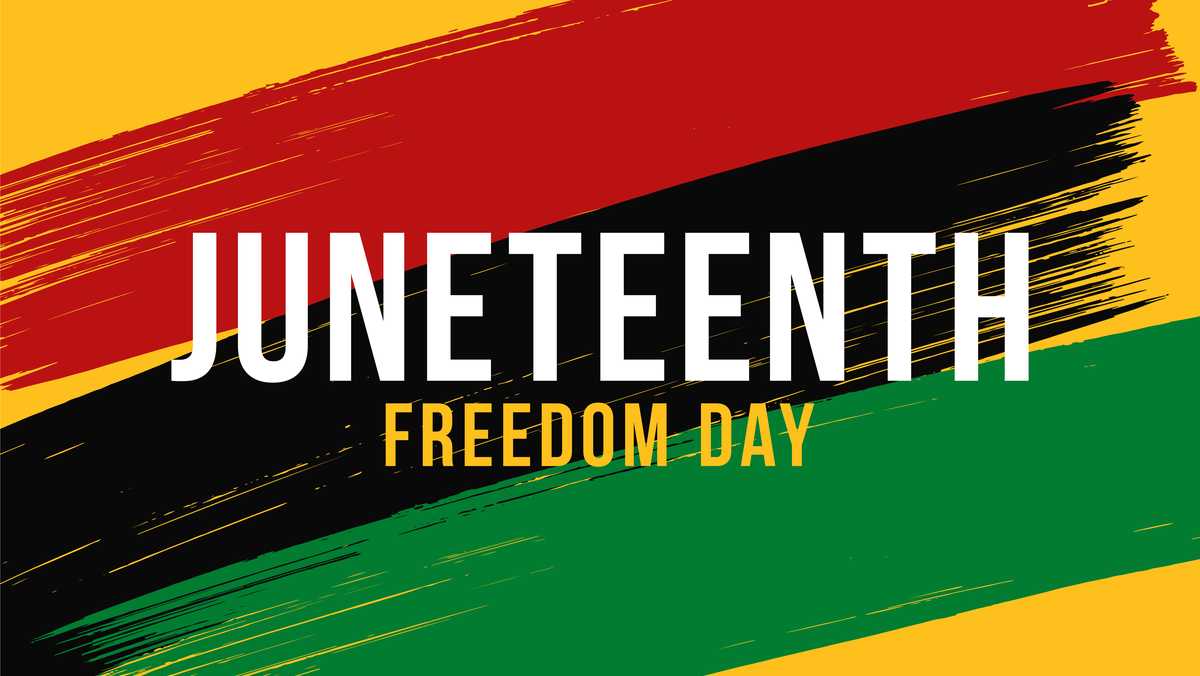Happy Juneteenth! For those who don’t know, Juneteenth is celebrated on June 19th. This holiday commemorates the emancipation of enslaved African Americans. Despite only obtaining its status as a federal holiday back in 2021, Juneteenth has been celebrated in America since 1865. So, keep reading and follow us along the timeline of this holiday’s inception and eventual recognition as a federal holiday.
Origins
To begin, the name “Juneteenth” is a portmanteau of the words June and nineteenth. Juneteenth celebrates the anniversary of the order, issued by Major General Gordon Granger on June 19th 1865, proclaiming freedom for slaves in Texas. This order, deemed General Order No. 3, stated “The people of Texas are informed that, in accordance with a proclamation from the Executive of the United States, all slaves are free. This involves an absolute equality of personal rights and rights of property between former masters and slaves, and the connection heretofore existing between them becomes that between employer and hired labor.” The Proclamation itself freed very few slaves, but it did lead to proposal and ratification of the 13th Amendment to the Constitution. The 13th Amendment formally abolished slavery throughout the United States.
This proclamation came an entire two years after the signing of the emancipation proclamation. In addition, part of General Order No.3 encouraged newly freed people to remain with their past owners. The order further read, “The freedmen are advised to remain quietly at their present homes and work for wages. They are informed that they will not be allowed to collect at military posts and that they will not be supported in idleness either there or elsewhere.” People were undeterred by this recommendation, and thus began the period known as the “Scatter”. Following this, former slaves immediately began to leave the area. In the following weeks, formerly enslaved people left Texas in great numbers. Many aimed to find family members and make their way to the postbellum United States.
Decline
Fast forwarding to the early 20th century, economic and political forces led to a decline in Juneteenth celebrations. From 1890 to 1908, Texas and all former confederate states passed new constitutions or amendments that effectively disenfranchised black people, excluding them from the political process. White-dominated state legislatures passed Jim Crow laws imposing second-class status onto African Americans. Gladys L. Knight writes that the decline in celebration was in part because “upwardly mobile [black people]…were ashamed of their slave past and aspired to assimilate into mainstream culture. Younger generations of [black people], becoming further removed from slavery were occupied with school…and other pursuits.”
In addition, the Great Depression forced many black people off of farms and into the cities to find work. Due to this, they often found difficulty taking the time off to celebrate. From 1936 to 1951, the Texas State Fair served as a destination for celebrating the holiday, contributing to its revival. From 1940 to 1970, in the second wave of the Great Migration, more than five million black people left the South for the North and West Coast. As historian Isabel Wilkerson writes, “The people from Texas took Juneteenth Day to Los Angeles, Oakland, Seattle, and other places they went.” In 1945, Juneteenth was introduced in San Francisco by Texas migrant Wesley Johnson.
Revival
Juneteenth soon saw a revival in celebrations in the 1960s following the Civil Rights Movement. The Poor People’s March, planned by Martin Luther King Jr., was purposely scheduled to coincide with the date. March participants took the celebration back to their home states and soon the holiday was reborn. Later, in 1996, the first federal legislation to recognize “Juneteenth Independence Day” was introduced in the U.S House of Representatives. It wasn’t until June 17th, 2021, that it officially obtained status as a federal holiday. Juneteenth is the first new federal holiday since Martin Luther King Jr. Day was declared a holiday in 1986.
Conclusion
While it is a huge step forward to have Juneteenth officially declared a federal holiday, that does not mean black people are not still disenfranchised and discriminated against in the United States. Since this issue is complex and requires a real deep dive to understand fully, we encourage you to read some of the following links to learn more.
Disenfranchisement and Suppression of Black Voters in the United States
Racial Disparity In Marijuana Arrests
The Origins of Modern-Day Policing
Unequal Opportunity: Race and Education
Racism and Discrimination in Health Care: Providers and Patients
Products listed are available at Cinder locations: Cinder North, 6010 N Division St, Spokane, Wa 99208; Cinder Downtown, 927 W 2nd Ave, Spokane, WA 99201; and Cinder Valley, 1421 N Mullen Rd B, Spokane Valley, Wa 99206 This product has intoxicating effects and may be habit-forming. Which is to say, cannabis can impair concentration, coordination, and judgment. Therefore, do not operate a vehicle or machinery under the influence of this drug. Furthermore, there may be health risks associated with consumption of this product. For use only by adults twenty-one and older. To sum up, keep out of the reach of children.



